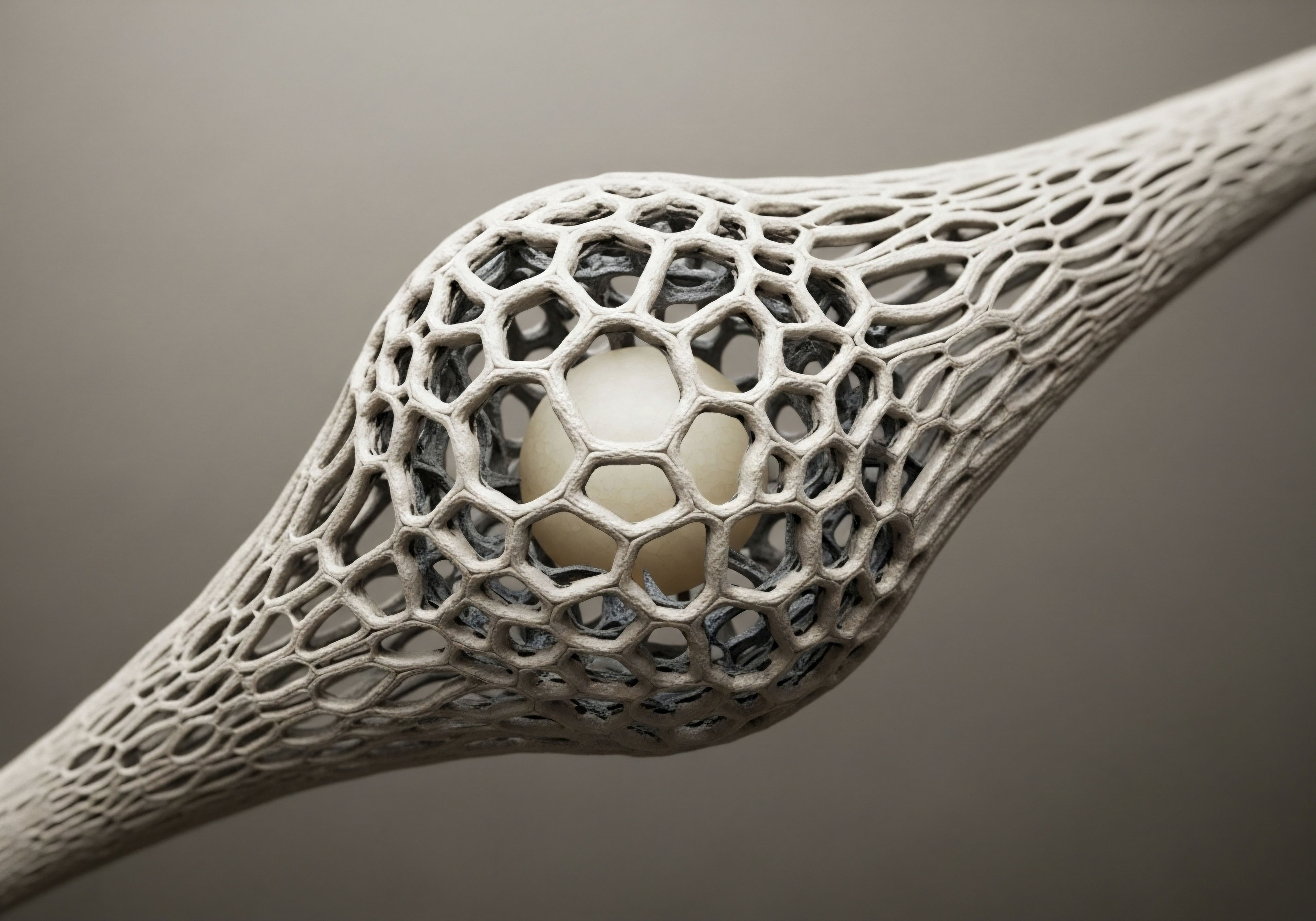

The Unseen Force behind Human Zenith
The pursuit of peak performance and enduring vitality defines the modern individual. Many seek external accelerators, complex protocols, or cutting-edge therapies to sharpen their edge. A singular, often overlooked, biological imperative serves as the original, most potent performance enhancing agent available. This foundational element, meticulously calibrated within our physiology, dictates the effectiveness of every other strategic adjustment one makes to their well-being.
Consider the intricate systems governing physical prowess, mental acuity, and hormonal balance. Each operates at its peak when supported by robust, restorative cycles of deep rest. Compromising these cycles initiates a cascade of systemic dysregulation. Individuals frequently attribute fatigue, cognitive drift, or a general reduction in zest to the inevitable march of time or external stressors. The actual culprit often lies deeper, fundamentally tied to a persistent deficit in their body’s capacity for daily restoration.
A significant reduction in sleep quality directly impacts the endocrine system, a master conductor of human chemistry. Testosterone levels in males, for example, demonstrate a substantial reduction with inadequate sleep, even in young, healthy cohorts. Growth hormone release, vital for cellular repair and muscle protein synthesis, predominantly occurs during specific sleep stages. Disrupting these stages curtails the body’s innate ability to rebuild and fortify itself, impacting body composition and recovery rates.
Cognition suffers profoundly when sleep duration is insufficient or fragmented. Decision-making clarity diminishes. Reaction times slow. The capacity for learning and memory consolidation weakens considerably. High-stakes environments demand unimpeachable mental performance, yet many operate with a persistent cognitive fog, unaware their internal supercomputer runs on low power. True mental resilience and sharp strategic thinking stem from deeply restorative nocturnal periods.
Beyond individual systems, sleep acts as the ultimate calibrator for metabolic health. Insulin sensitivity improves with consistent, quality sleep, a critical factor for body fat management and long-term energy stability. Conversely, chronic sleep deprivation contributes to insulin resistance, making healthy weight maintenance a formidable challenge. The body’s internal clock, the circadian rhythm, orchestrates these metabolic processes. Misaligning daily rhythms through inconsistent sleep directly sabotages metabolic efficiency.
Rest serves as the unparalleled catalyst for human optimization, defining the true scope of personal capability.
Reclaiming peak form requires an unshakeable commitment to this fundamental biological process. This is not simply about avoiding drowsiness; it concerns maximizing every physiological advantage. The pursuit of an optimized self demands acknowledging sleep’s absolute dominance as the primary force in cellular rejuvenation, hormonal recalibration, and mental fortitude. Every elite performance, every moment of sustained vigor, finds its origin here. This sets the stage for a deliberate engagement with sleep as a precise, scientific tool for sustained high output.


Decoding the Body’s Innate Restorative Cycles
Understanding sleep’s mechanistic operations reveals its power as a performance enhancer. The body cycles through distinct phases, each offering unique restorative benefits. These phases encompass Non-Rapid Eye Movement (NREM) and Rapid Eye Movement (REM) sleep, representing a sophisticated biological program for systemic renewal. Mastering the internal architecture of sleep involves recognizing the purpose of each phase and creating conditions for their optimal progression.
NREM sleep accounts for approximately 75-80% of total sleep time, progressing through three stages. The early stages represent a gradual descent into deeper rest, characterized by slowing brain waves and relaxed muscle tension. Deeper NREM stages, sometimes termed “slow-wave sleep,” are physiologically profound. During this phase, the pituitary gland releases significant pulsatile bursts of growth hormone.
This polypeptide hormone orchestrates tissue repair, cellular regeneration, and muscle synthesis. Individuals seeking to improve body composition, accelerate recovery from intense physical activity, or combat signs of biological aging gain immensely from prioritizing this deep NREM phase. Without adequate time in these restorative depths, the body’s internal repair crews lack their essential directives.
Testosterone production, a vital aspect of male vitality and a contributor to female health, also experiences peak synthesis during deep sleep. Fragmented sleep patterns directly correlate with diminished testosterone levels, irrespective of age. This reduction manifests as lowered drive, decreased muscle mass, and increased body fat storage. Recalibrating these hormonal systems commences with consistent, high-quality sleep.
The brain undergoes a distinct cleaning process during sleep through the glymphatic system. This intricate network clears metabolic waste products, including amyloid-beta proteins, which accumulate during waking hours. This cerebral detoxification ensures optimal neuronal function and supports long-term cognitive integrity. Imagine a nightly deep clean for your most valuable processing unit. Interference with this critical process impairs cognitive function, manifesting as brain fog, diminished focus, and slower information processing speeds.
REM sleep, characterized by active brain waves and vivid dreaming, follows cycles of NREM. While physical rest dominates NREM, REM is crucial for emotional regulation, memory consolidation, and learning. The brain sorts, processes, and stores the day’s experiences, transforming transient memories into enduring knowledge. This phase solidifies neural connections, enhancing problem-solving abilities and creative capacity. Intellectual performance, therefore, relies heavily on uninterrupted REM sleep.
A proactive approach to sleep optimization targets both duration and quality. This means establishing consistent sleep and wake times, aligning with the body’s natural circadian rhythm. Controlling the sleep environment proves equally significant. Light exposure, particularly blue light from screens, suppresses melatonin production, a hormone essential for initiating sleep. Eliminating artificial light sources in the hours leading to bedtime provides a crucial signal for physiological winding down.
Temperature regulation within the sleep environment impacts sleep architecture. A cooler room, typically between 60-67 degrees Fahrenheit, supports deeper, more continuous sleep. The body’s core temperature naturally dips during sleep, and a cool environment assists this physiological process. Nutritional timing also plays a part; avoiding heavy meals or excessive stimulants close to bedtime prevents metabolic disruption.
Strategic daytime light exposure, particularly in the morning, calibrates the body’s internal clock, signaling alertness and promoting a robust sleep drive later in the evening. This reinforces the natural hormonal rhythm that governs our sleep-wake cycle. A disciplined approach to these environmental and behavioral factors creates the ideal conditions for the body’s inherent restorative capabilities.
Achieving profound sleep involves a precise orchestration of internal and external variables. It commands attention to detail, akin to fine-tuning a high-performance machine. Each adjustment contributes to an aggregated improvement in the body’s ability to heal, restore, and prepare for the demands of another day operating at maximum capacity.
- Maintain a consistent sleep schedule daily, even on weekends. This regular timing reinforces circadian alignment.
- Ensure your sleep sanctuary remains dark, quiet, and cool. Block out all light, minimize noise, and set the thermostat to an optimal temperature.
- Limit blue light exposure from electronic devices at least 90 minutes before bedtime. This protects melatonin secretion.
- Avoid caffeine and heavy meals in the hours leading to sleep. These substances can disrupt natural sleep architecture.
- Incorporate a pre-sleep wind-down ritual, such as light reading, meditation, or a warm bath. This signals mental and physical relaxation.
- Optimize daytime light exposure, especially early morning sunlight, to calibrate the body’s internal clock.
- Engage in regular physical activity, but avoid intense exercise too close to bedtime. Physical exertion helps build sleep drive.
- Consider strategic supplementation with agents like magnesium L-threonate or apigenin, under professional guidance, to support relaxation and sleep initiation.


Activating Your Primal Performance Edge
Understanding the precise application of sleep optimization transforms it from a passive habit into an active strategy. The question shifts from “if” to “when” to prioritize this potent physiological recalibration. Individuals often notice a subtle but persistent erosion of their peak performance long before they connect it to their sleep patterns. The moment to activate this primal edge arrives when one senses a diminished capacity across any domain.
Recognize the signals. Persistent fatigue, an unexpected increase in body fat, or a general lack of mental sharpness indicate a system operating below its potential. These are not inevitable consequences of advancing years. They are communication from a sophisticated biological apparatus, signaling a need for fundamental resetting.
When hormonal levels begin to drift from optimal ranges, or when recovery from physical exertion takes longer, sleep emerges as a primary corrective measure. It is the initial, most accessible intervention before considering more targeted therapies like hormone replacement or peptide protocols.
The synergy between optimized sleep and other wellness protocols proves compelling. For individuals pursuing hormone replacement therapy (HRT), such as testosterone replacement or estrogen optimization, sleep becomes a powerful accelerant. Consistent, high-quality sleep amplifies the body’s response to these external inputs, enhancing their overall efficacy. The body’s ability to metabolize and utilize hormones improves significantly when supported by robust restorative cycles. This means individuals see more pronounced, sustained benefits from their HRT investment.
Similarly, peptide therapies, which provide targeted instructions to cellular machinery, operate with greater precision in a system already primed by optimal sleep. Growth hormone-releasing peptides, for instance, naturally synchronize with the body’s endogenous pulsatile release during deep sleep. Supplying these compounds while neglecting the sleep architecture diminishes their full spectrum of potential. Sleep prepares the cellular environment, making it receptive to these advanced agents.
Committing to sleep mastery unlocks a new echelon of vitality, transforming aspiration into tangible reality.
The benefits of prioritizing sleep reveal themselves with remarkable speed. Within days, individuals report improvements in mood stability and reduced irritability. Mental clarity and focus sharpen considerably. Energy levels increase, not through external stimulation, but from internal replenishment. Over weeks, changes in body composition become evident ∞ a reduction in stubborn fat deposits, an improvement in muscle tone.
Physical performance metrics, such as strength and endurance, demonstrate measurable gains. Recovery times from training sessions shorten, allowing for greater consistency in pursuit of athletic goals.
Long-term adherence to a rigorous sleep protocol translates into profound anti-aging advantages. Telomere length, a biomarker of cellular aging, shows greater stability in well-rested individuals. Chronic inflammation, a driver of many age-related performance blockers, decreases with sustained sleep quality. The very pace of biological aging can be influenced by consistently providing the body with its most powerful tool for nightly cellular recalibration.
Integrating advanced sleep protocols into one’s daily existence represents a strategic decision. It signifies a shift from passively experiencing life to actively architecting one’s biological future. This is not merely about comfort; it concerns a deliberate engagement with a foundational lever for human potential.
For those committed to sustained high performance and an enduring state of optimized vitality, the time to prioritize sleep is always now. It is the immediate, actionable pathway to unlocking deeper levels of physical, mental, and hormonal well-being, paving the way for a life lived at full power.

Claiming Your Biological Sovereignty
The human body operates as a complex, self-optimizing system, yet its most potent regulatory tool often faces neglect. Sleep is not a luxury; it serves as the foundational pillar for every peak performance metric, every measure of enduring vitality. It represents an undeniable biological truth ∞ ultimate renewal stems from profound rest.
Individuals seeking to command their physical and mental landscape, to truly master their physiology, must first master the night. This foundational understanding empowers a proactive stance toward personal longevity and peak human function. You possess the innate capacity for profound self-restoration; activating it demands discipline and an appreciation for its unparalleled transformative power.



